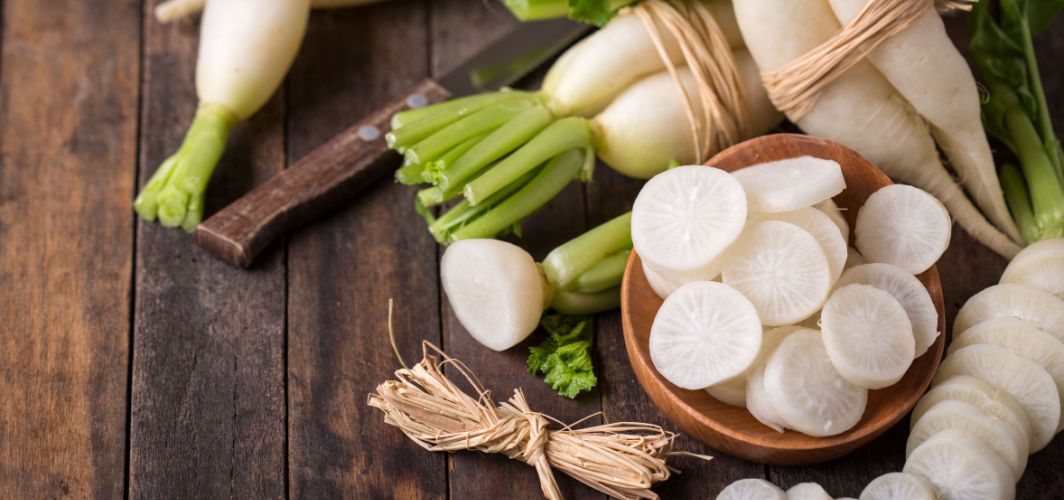Diabetes Management
Can One Eat Radish During Navratri Fasts?
2 min read
By Apollo 24|7, Published on - 20 October 2023, Updated on - 27 October 2023
Share this article
0
0 like

Navratri, a festival celebrated with great fervour and devotion in India goes on for nine days. During this festival, many people observe fasts as a way to purify their bodies and minds. These fasts typically involve avoiding certain foods, and the specific dietary restrictions can vary from person to person. While there are numerous rules and traditions regarding fasting during Navratri, one common question that arises is whether it's permissible to consume radishes.
Radishes are a type of root vegetable that comes in various colours and sizes. They are often used in salads, snacks, and even cooked dishes. When it comes to Navratri fasting, the acceptability of radishes depends on the individual's beliefs, customs, and specific rules they follow. Here are some key factors to consider when deciding whether radishes can be a part of your Navratri fasting diet:
1. Regional and Cultural Variations
Navratri traditions can vary by region and community. In some regions, radishes may be considered acceptable during fasting, while in others, they might be prohibited. It's essential to be aware of the customs and practices specific to your community or the region you belong to.
2. Root Vegetables and Fasting
In many Hindu traditions, root vegetables like radishes, potatoes, and carrots are usually avoided during fasting. This is because fasting is often associated with refraining from consuming foods that grow underground, as they are believed to be tamasic (having qualities of darkness, ignorance, and lethargy). However, some individuals and communities may permit certain root vegetables during their fasts.
3. Nutritional Benefits
Radishes are low in calories and rich in essential nutrients like vitamin C, fiber, and antioxidants. They can provide a healthy and refreshing addition to your fasting meals if allowed by your customs.
5. Moderation
If you decide to include radishes in your Navratri fasting diet, it's essential to consume them in moderation. Overindulging in any food, even those permitted during fasting, may not align with the spiritual and health goals of the fast.
Conclusion
In conclusion, the permissibility of eating radishes during Navratri fasts can vary based on regional customs and individual beliefs. It's crucial to respect and follow the traditions of your community and family. If radishes are allowed in your fasting guidelines, you can enjoy their nutritional benefits while observing the spiritual significance of the fast. However, if you follow stricter fasting rules that exclude root vegetables, it's advisable to adhere to those guidelines. Ultimately, Navratri fasting is a personal and spiritual journey, and the dietary choices you make should align with your customs and beliefs.
Diabetes Management
Consult Top Diabetologists
View AllLeave Comment
Recommended for you

Diabetes Management
How To Know If You Have Insulin Resistance?
Reduced reactivity to insulin is one of the symptoms of insulin resistance, which affects how glucose is metabolised. Recognising its symptoms, understanding its causes, and undergoing appropriate testing are essential for early detection and effective management. With lifestyle modifications, medications, and regular monitoring, individuals can successfully manage insulin resistance and improve their overall health.

Diabetes Management
Manage Your Diabetes Like A Pro With Apollo 24|7's 12-Week EMPOWER Programme
Diabetes is one of the most common and widespread lifestyle diseases, affecting millions of people worldwide. Keeping the condition under control is a very challenging task. The Diabetes Management Programme by Apollo 24|7 can help you learn how to manage your condition on your own. Read on to learn how.

Diabetes Management
Continuous Glucose Monitoring: How Does it Help?
CGM is a device that helps individuals with diabetes track their glucose levels continuously. A tiny sensor is inserted under the skin to measure glucose in the interstitial fluid. It helps individuals monitor glucose levels throughout the day and night, thereby allowing them to improve their HbA1c levels, reduce hypoglycemia events, and assess the impact of diet and exercise on glucose levels.
Subscribe
Sign up for our free Health Library Daily Newsletter
Get doctor-approved health tips, news, and more.
Visual Stories

8 Fruits That are Incredibly Healthy for Diabetes
Tap to continue exploring
Recommended for you

Diabetes Management
How To Know If You Have Insulin Resistance?
Reduced reactivity to insulin is one of the symptoms of insulin resistance, which affects how glucose is metabolised. Recognising its symptoms, understanding its causes, and undergoing appropriate testing are essential for early detection and effective management. With lifestyle modifications, medications, and regular monitoring, individuals can successfully manage insulin resistance and improve their overall health.

Diabetes Management
Manage Your Diabetes Like A Pro With Apollo 24|7's 12-Week EMPOWER Programme
Diabetes is one of the most common and widespread lifestyle diseases, affecting millions of people worldwide. Keeping the condition under control is a very challenging task. The Diabetes Management Programme by Apollo 24|7 can help you learn how to manage your condition on your own. Read on to learn how.

Diabetes Management
Continuous Glucose Monitoring: How Does it Help?
CGM is a device that helps individuals with diabetes track their glucose levels continuously. A tiny sensor is inserted under the skin to measure glucose in the interstitial fluid. It helps individuals monitor glucose levels throughout the day and night, thereby allowing them to improve their HbA1c levels, reduce hypoglycemia events, and assess the impact of diet and exercise on glucose levels.
